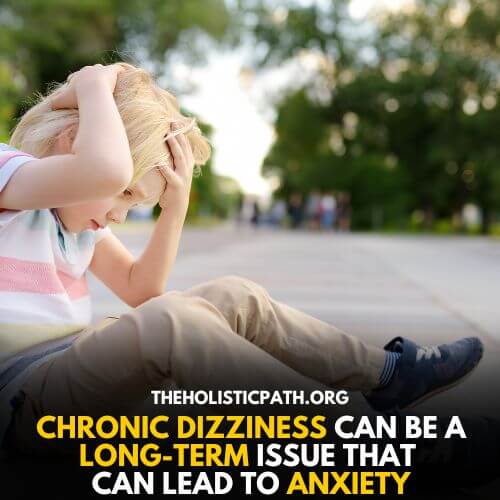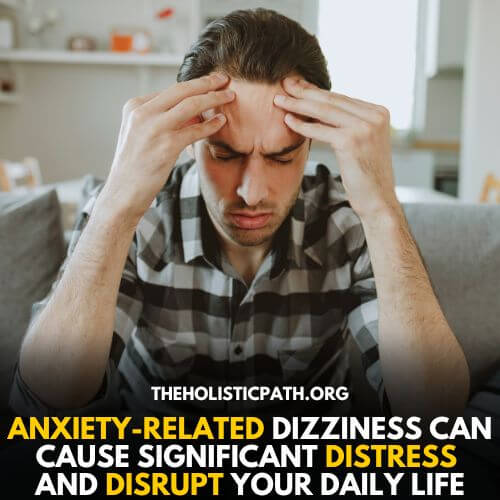Many of us suffer from anxiety from time to time, and we know that feeling all too well. But is it possible for our bodies to express the stress we feel? Is dizziness a sign of anxiety?
In this article, we take a look at what causes feelings of dizziness, if it is linked to experiencing more anxious feelings, and how we can look after ourselves during these times. So, if it has happened to you, stay tuned as we explore this topic further!
Lightheadedness And Dizziness
Lightheadedness and dizziness are terms often used interchangeably to describe a wide range of feelings, such as feeling faint, unsteady, or having a sensation that the room is spinning. It is important to note that lightheadedness and dizziness are symptoms, not diseases themselves.
Lightheadedness is often caused by a temporary lack of blood flow to the brain, which can be the result of dehydration, low blood pressure (hypotension), or standing up too quickly — a condition known as postural hypotension. Other causes include heavy sweating or diarrhea due to an illness, inner ear infections, headaches or migraines, heat exhaustion, or stroke.
Dizziness is usually related to lightheadedness but may also be caused by specific medical conditions such as Meniere’s disease (a disorder of the inner ear), vertigo (a sense of spinning), multiple sclerosis (MS), diabetes, and some types of heart disease. Dizziness can also be triggered by certain medications, anxiety, or depression.
10 Common Signs Of Dizziness
The signs and symptoms of dizziness vary from one person to another. Common signs include:
- Feeling faint or lightheaded.
- A spinning sensation (vertigo).
- Feeling weak or unsteady on your feet.
- Difficulty focusing or concentrating on tasks.
- Blurry vision or double vision.
- Nausea, vomiting, or loss of appetite.
- Anxiety, fear, or panic attacks.
- Sweating or feeling hot and cold at the same time.
- Rapid heart rate, palpitations, or chest pain.
- Ringing in the ears (tinnitus).
Is Dizziness A Sign Of Anxiety
Dizziness is not always a sign of anxiety, but it can be in some cases. Anxiety can cause changes to the body’s physiology that may lead to feelings of lightheadedness, dizziness, or vertigo. Physical symptoms such as rapid heart rate, profuse sweating, and hyperventilation can reduce the oxygen supply to the brain which in turn causes lightheadedness and dizziness.
Also, increased tension in certain muscles around the neck, chest, and head can irritate nerves leading to sensations of instability and vertigo.
Research has shown that people with panic disorder or generalized anxiety disorder (GAD) are more likely to experience dizziness than those without an anxiety disorder. In one study published in the journal Psychosomatic Medicine, dizziness was reported by over 70% of people with GAD compared to only 30% of healthy controls.
Another study found that higher levels of anxiety were associated with an increased risk of developing vertigo and feeling unsteady on one’s feet. In addition, a review published in the Journal of Neurology examined several studies and concluded that certain forms of anxiety may increase the risk of developing benign paroxysmal positional vertigo (BPPV). BPPV is caused by particles moving around inside the inner ear which can create a sensation of spinning or swaying when changing head positions.
6 Common Causes Of Dizziness When Experiencing Anxiety
When experiencing anxiety, some people may experience temporary dizziness. Dizziness can be caused by a variety of factors including changes to the body’s physiology or psychological issues such as panic attacks or generalized anxiety disorder (GAD). Some common causes of dizziness include:
- Hyperventilation: Hyperventilation occurs when a person breathes at an abnormally fast rate, leading to oxygen depletion in the body. It is a common symptom of anxiety and occurs when someone breathes too quickly or deeply. The amount of oxygen inhaled exceeds the amount of carbon dioxide exhaled, resulting in an imbalance between the two. This can cause lightheadedness, dizziness, shortness of breath, chest pain, tingling sensations, numbness in the limbs, and other symptoms.
- Inner Ear Disorder: Inner ear disorders such as Meniere’s disease and vestibular neuritis can cause dizziness when experiencing anxiety. Vestibular neuritis is an inflammation of the nerves in the inner ear that can lead to balance problems, vertigo, and nausea. Meniere’s disease is a disorder of the inner ear that is believed to be caused by fluid buildup in the labyrinth, leading to episodes of dizziness and vertigo.
- Stress hormones: Stress hormones such as adrenaline and cortisol can cause changes in the body’s physiology which can lead to feelings of dizziness. Adrenaline is a hormone released in response to stress, while cortisol is known as the “stress hormone”. Elevated levels of stress hormones have been linked to an increase in heart rate, blood pressure, and other physiological changes that can lead to dizziness or lightheadedness.
- Vasovagal Syncope: Vasovagal syncope is a condition in which the blood vessels of the body become overly dilated, resulting in a drop in blood pressure and reduced oxygen to the brain. This can cause a person to experience dizziness or faint when feeling anxious. It is caused by an overstimulation of the vagus nerve, which regulates heart rate and blood flow.
- Subjective Sensations: Subjective sensations refer to the body’s perceived internal and external environment. This includes things like balance, proprioception (awareness of where one’s body parts are in relation to each other), and spatial orientation. Anxiety can cause changes in these sensations which can lead to feelings of dizziness or unsteadiness on one’s feet. Subjective sensations such as increased arousal, tension, fear, and dread can all contribute to dizziness when experiencing anxiety.
- Benign Paroxysmal Positional Vertigo (BPPV): Benign paroxysmal positional vertigo (BPPV) is a disorder of the inner ear caused by particles inside the labyrinth. It can cause episodes of vertigo and dizziness when changes in head positions occur. Studies have shown that people with anxiety disorders, such as GAD, are more likely to experience BPPV than those without an anxiety disorder.
These are some of the most common causes of dizziness when experiencing anxiety. If you are having any symptoms related to anxiety or feeling dizzy, it is important to seek medical attention so that your doctor can assess your condition and provide treatment options.
Can Dizziness Cause Anxiety
In addition to anxiety causing dizziness, it is also possible for the dizziness to cause anxiety. Dizziness can be a frightening experience, and it can cause feelings of panic and fear. People with existing anxiety disorders may be particularly sensitive to the sensations of dizziness, as they already have increased levels of stress hormones in their body which can exacerbate the symptoms.
Chronic Dizziness
Chronic dizziness can be a long-term issue that can lead to anxiety. It is defined as episodes of dizziness and lightheadedness lasting for more than 4 weeks. Chronic dizziness can affect any aspect of life and it can leave individuals constantly feeling anxious, tired, and disoriented.

People living with chronic dizziness often feel anxious about triggers such as changes in position or loud noises, making it difficult to perform daily tasks. It can also cause fear of falling due to the constant unsteadiness, which may lead to further anxiety if not managed appropriately.
Acute Dizziness
Acute dizziness refers to episodes of discomfort that last for less than 4 weeks. It can be caused by anxiety or panic disorder, motion sickness, dehydration, or low blood sugar. Acute dizziness can cause people to experience fear and panic due to the sudden onset of symptoms and sensations that they may not be used to.
This fear of the unknown can lead to further anxieties if left unmanaged.
Vertigo
Vertigo is a type of dizziness that often causes individuals to feel like everything around them is moving or spinning. It can happen when there is an imbalance in the inner ear’s vestibular system, which helps us maintain balance and orientation in space.
Vertigo can also be caused by certain medications, head trauma, infections, or other major illnesses such as Multiple Sclerosis (MS). It can cause extreme feelings of disorientation and fear which can lead to further anxiety if not managed properly.
Does Anxiety Dizziness Go Away?
Yes, anxiety and dizziness can go away with proper treatment and management. The key is to identify the underlying cause of your dizziness in order to properly address it. If an underlying medical condition such as BPPV or chronic dehydration is causing your symptoms, then it may require medical intervention in order to resolve the issue.
If anxiety or panic disorder is the cause, then psychotherapy and lifestyle modifications can be extremely helpful in addressing the root cause and reducing feelings of dizziness. Medications such as benzodiazepines are often used to help manage symptoms of anxiety-related dizziness.

It is important to remember that every individual’s experience with dizziness is unique and it is important to seek medical advice if you are experiencing symptoms. With the right treatment, anxiety-related dizziness can be managed and eventually resolved.
How Do I Know If My Dizziness Is From Anxiety?
If you are experiencing dizziness, it may be difficult to determine the cause. It is important to speak with your doctor if you experience any of the following symptoms:
- You may feel unsteady on your feet or have trouble balancing even when you’re standing still.
- You might experience nausea and vomiting due to dizziness.
- Headaches and ringing in the ears may accompany episodes of dizziness.
- Your vision might be distorted or blurred by feelings of vertigo, causing lightheadedness and confusion.
- Sweating, trembling, and rapid breathing are common physical symptoms associated with anxiety-related dizziness.
- Anxiety-induced dizziness can lead to feelings of panic, fear, or dread that seem out of proportion to the situation at hand.
- You may also startle more easily than usual as a result of feeling a sense of disorientation or an impending sense of doom and helplessness during these episodes.
- Muscle tension and tightness may cause headaches, neck aches, shoulder pain, and other types of bodily discomfort that come along with dizziness caused by anxiety attacks.
- Hyperventilation can be a symptom of anxiety-induced dizziness as well as a cause because it reduces oxygen to the brain which can leave you feeling faint or off balance during episodes of high stress or fear associated with anxiety attacks.
- If any physical activity such as walking up stairs causes you to become suddenly lightheaded it could be an indication that your dizziness is related to anxiety issues rather than due to another medical condition like inner ear infections or blood pressure fluctuations caused by changes in diet or medication intake for example.
It is also important to remember that while anxiety can cause dizziness, it can also occur due to more serious conditions such as stroke or MS. It’s always best to speak with a doctor in order to rule out any more serious underlying causes of your dizziness.

15 Ways To Manage Dizziness Caused By Anxiety
Anxiety-related dizziness can cause significant distress and disrupt your daily life. Fortunately, there are many ways to manage the symptoms associated with dizziness caused by anxiety. Here are 14 tips to help you cope:
- Create awareness of your symptoms and triggers. Pay attention to the times when you feel dizzy and see if there is any pattern or commonalities in what you are doing or feeling
- Take deep breaths – inhale deeply and slowly through your nose, hold for a few seconds, then exhale slowly out through your mouth to help reduce feelings of dizziness.
- Close your eyes and focus on the sensation of stillness – this will help you regain mental clarity and calm down if you are feeling overwhelmed or scared due to feelings of disorientation from dizziness.
- Drink plenty of water – dehydration can make symptoms worse so be sure to stay hydrated throughout the day with ample amounts of fluids such as water or juice.
- Practice relaxation techniques such as progressive muscle relaxation, mindfulness meditation, guided imagery, or yoga to relieve stress and tension which can trigger episodes of dizziness.
- Maintain an active lifestyle – exercise can help reduce stress levels and promote better overall health, both of which are important in managing dizziness caused by anxiety.
- Eat a balanced diet with plenty of fruits, vegetables, and whole grains to ensure healthy blood sugar levels which can reduce feelings of vertigo or lightheadedness caused by anxiety attacks.
- Spend time in nature – taking a walk in the park or spending time outdoors can help reduce stress levels and provide an atmosphere of peace and tranquility which can help to reduce feelings of dizziness.
- Cut back on caffeine – too much of this stimulant can cause palpitations or racing heartbeats that may contribute to feelings of dizziness associated with anxiety.
- Engage in activities you enjoy such as reading, listening to music, playing games, or spending time with friends – this will help keep your mind occupied and distracted from the physical symptoms associated with anxiety-induced dizziness.
- Get enough sleep – chronic lack of sleep increases cortisol levels and worsens symptoms of anxiety which can also cause episodes of dizziness related to changes in orientation from fatigue or exhaustion.
- Try supplements such as ginger, ginkgo biloba, or vitamin B6 which are known to help reduce feelings of dizziness.
- Talk to a therapist about your anxiety symptoms and explore ways to manage them more effectively in order to reduce episodes of dizziness from occurring as a result of overwhelming fear or stress.
- Take breaks throughout the day – if you find yourself feeling overwhelmed by anxious thoughts, take a few minutes each hour to step away from whatever is going on and focus on deep breathing exercises or mindfulness techniques until you feel calmer and more grounded.
- Stay hydrated! Dehydration is one of the most common causes of dizziness, so make sure you’re drinking plenty of water throughout the day.
3 Tips For Preventing Anxiety-Induced Dizziness
Anxiety-induced dizziness can be a difficult condition to manage, but there are several steps you can take to prevent episodes from occurring. Here are some tips for preventing anxiety-induced dizziness:
- Talk Therapy: Talk therapy can help you stop feeling dizzy because of anxiety. A therapist will talk with you and help you figure out why you feel dizzy and how to stop feeling that way. They can also help teach you ways to relax, like taking deep breaths or spending time outside in nature. This can make it easier for you to stay calm and not get too worried.
- Managing Anxiety: Managing anxiety is key to reducing feelings of dizziness. You can do this by practicing relaxation techniques such as mindfulness meditation, progressive muscle relaxation, and guided imagery. Additionally, try to keep your environment free from stressors that may trigger an anxious episode such as loud noises or too much activity. Also, be sure to get plenty of exercises and practice good sleep hygiene to stabilize cortisol levels in your body.
- Physical Therapy: Physical therapy can also help you manage your anxiety and dizziness. This type of treatment may include balance exercises, strength training, stretching, or even vestibular rehabilitation to reduce the feeling of vertigo and lightheadedness caused by inner ear issues. Additionally, physical therapists can provide lifestyle guidance for nutrition and exercise which can play a significant role in reducing feelings of dizziness associated with anxiety.
Conclusion
When trying to decipher ‘is dizziness a sign of anxiety’, it is most important to talk to those closest to you and consult with a physician. Dizziness is often caused by many contributing factors – from dehydration to side effects of medications – but it is possible that your body’s response is related to feelings of mental strain or confusion. Keep in mind that addressing these feelings can be just as beneficial as hydrating or speaking with a doctor: find what works best for you and seek help when needed.
References
Wiltink, J., Tschan, R., Michal, M., Subic-Wrana, C., Eckhardt-Henn, A., Dieterich, M., & Beutel, M. E. (2009). Dizziness: Anxiety, health care utilization and health behavior—. Journal of Psychosomatic Research, 66(5), 417–424. https://doi.org/10.1016/j.jpsychores.2008.09.012
Staab, J. P., & Ruckenstein, M. J. (2005). Chronic Dizziness and Anxiety. Archives of Otolaryngology–Head &Amp; Neck Surgery, 131(8), 675. https://doi.org/10.1001/archotol.131.8.675
